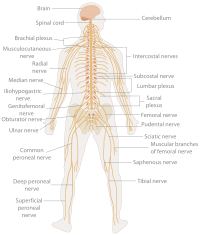
Photo from wikipedia
Oligodendrocytes are the myelinating glia of the central nervous system and are generated after oligodendrocyte progenitor cells (OPCs) transition into pre‐oligodendrocytes and then into myelinating oligodendrocytes. Myelin is essential for… Click to show full abstract
Oligodendrocytes are the myelinating glia of the central nervous system and are generated after oligodendrocyte progenitor cells (OPCs) transition into pre‐oligodendrocytes and then into myelinating oligodendrocytes. Myelin is essential for proper signal transmission within the nervous system and axonal metabolic support. Although the intrinsic and extrinsic factors that support the differentiation, survival, integration, and subsequent myelination of appropriate axons have been well investigated, little is known about how mitochondria‐related pathways such as mitochondrial dynamics, bioenergetics, and apoptosis finely tune these developmental events. Previous findings suggest that changes to mitochondrial morphology act as an upstream regulatory mechanism of neural stem cell (NSC) fate decisions. Whether a similar mechanism is engaged during OPC differentiation has yet to be elucidated. Maintenance of mitochondrial dynamics is vital for regulating cellular bioenergetics, functional mitochondrial networks, and the ability of cells to distribute mitochondria to subcellular locations, such as the growing processes of oligodendrocytes. Myelination is an energy‐consuming event, thus, understanding the interplay between mitochondrial dynamics, metabolism, and apoptosis will provide further insight into mechanisms that mediate oligodendrocyte development in healthy and disease states. Here we will provide a concise overview of oligodendrocyte development and discuss the potential contribution of mitochondrial mitochondrial‐mediated mechanisms to oligodendrocyte bioenergetics and development.
Journal Title: Journal of Neuroscience Research
Year Published: 2022
Link to full text (if available)
Share on Social Media: Sign Up to like & get
recommendations!